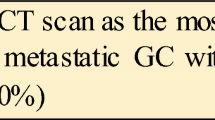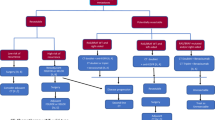Abstract
Background
Imatinib inhibits the KIT and PDGFR tyrosine kinases, resulting in its notable antitumor activity in gastrointestinal stromal tumor (GIST). We previously reported the early results of a multi-institutional prospective trial (RTOG 0132) using neoadjuvant/adjuvant imatinib either in primary resectable GIST or as a planned preoperative cytoreduction agent for metastatic/recurrent GIST.
Methods.
Patients with primary GIST (≥5 cm, group A) or resectable metastatic/recurrent GIST (≥2 cm, group B) received neoadjuvant imatinib (600 mg/day) for approximately 2 months and maintenance postoperative imatinib for 2 years. We have now updated the clinical outcomes including progression-free survival, disease-specific survival, and overall survival at a median follow-up of 5.1 years, and we correlate these end points with duration of imatinib therapy.
Results
Sixty-three patients were originally entered (53 analyzable: 31 in group A and 22 in group B). Estimated 5-year progression-free survival and overall survival were 57% in group A, 30% in group B; and 77% in group A, 68% in group B, respectively. Median time to progression has not been reached for group A and was 4.4 years for group B. In group A, in 7 of 11 patients, disease progressed >2 years from registration; 6 of 7 patients with progression had stopped imatinib before progression. In group B, disease progressed in 10 of 13 patients >2 years from registration; 6 of 10 patients with progressing disease had stopped imatinib before progression. There was no significant increase in toxicity compared with our previous short-term analysis.
Conclusions
This long-term analysis suggests a high percentage of patients experienced disease progression after discontinuation of 2-year maintenance imatinib therapy after surgery. Consideration should be given to studying longer treatment durations in intermediate- to high-risk GIST patients.



Similar content being viewed by others
References
Demetri GD, von Mehren M, Antonescu CR, et al. NCCN Task Force report: update on the management of patients with gastrointestinal stromal tumors. J Natl Compr Canc Network. 2010;8:S1–41.
Casali PG, Jost L, Reichardt P, et al. Gastrointestinal stromal tumours: ESMO clinical recommendations for diagnosis, treatment and follow-up. Ann Oncol. 2009;20(Suppl 4):64–7.
Corless CL, Heinrich MC. Molecular pathobiology of gastrointestinal stromal sarcomas. Annu Rev Pathol. 2008;3:557–86.
Fletcher CD, Berman JJ, Corless C, et al. Diagnosis of gastrointestinal stromal tumors: a consensus approach. Hum Pathol. 2002;33:459–65.
Heinrich MC, Corless CL, Duensing A, et al. PDGFRA activating mutations in gastrointestinal stromal tumors. Science. 2003;299(5607):708–10.
Demetri GD, von Mehren M, Blanke CD, et al. Efficacy and safety of imatinib mesylate in advanced gastrointestinal stromal tumors. N Engl J Med. 2002;347:472–80.
Dematteo RP, Ballman KV, Antonescu CR, et al. Adjuvant imatinib mesylate after resection of localised, primary gastrointestinal stromal tumour: a randomised, double-blind, placebo-controlled trial. Lancet. 2009;373(9669):1097–104.
Blanke CD, Rankin C, Demetri GD, et al. Phase III randomized, intergroup trial assessing imatinib mesylate at two dose levels in patients with unresectable or metastatic gastrointestinal stromal tumors expressing the kit receptor tyrosine kinase: S0033. J Clin Oncol. 2008;26:626–32.
Blanke CD, Demetri GD, von Mehren M, et al. Long-term results from a randomized phase II trial of standard- versus higher-dose imatinib mesylate for patients with unresectable or metastatic gastrointestinal stromal tumors expressing KIT. J Clin Oncol. 2008;26:620–5.
Verweij J, Casali PG, Zalcberg J, et al. Progression-free survival in gastrointestinal stromal tumours with high-dose imatinib: randomised trial. Lancet. 2004;364(9440):1127–34.
Zalcberg JR, Verweij J, Casali PG, et al. Outcome of patients with advanced gastro-intestinal stromal tumours crossing over to a daily imatinib dose of 800 mg after progression on 400 mg. Eur J Cancer. 2005;41:1751–7.
Debiec-Rychter M, Sciot R, Le Cesne A, et al. KIT mutations and dose selection for imatinib in patients with advanced gastrointestinal stromal tumours. Eur J Cancer. 2006;42:1093–103.
Le Cesne A, Van Glabbeke M, Verweij J, et al. Absence of progression as assessed by response evaluation criteria in solid tumors predicts survival in advanced GI stromal tumors treated with imatinib mesylate: the intergroup EORTC-ISG-AGITG phase III trial. J Clin Oncol. 2009;27:3969–74.
Eisenberg BL, Harris J, Blanke CD, et al. Phase II trial of neoadjuvant/adjuvant imatinib mesylate (IM) for advanced primary and metastatic/recurrent operable gastrointestinal stromal tumor (GIST): early results of RTOG 0132/ACRIN 6665. J Surg Oncol. 2009;99:42–7.
McAuliffe JC, Hunt KK, Lazar AJ, et al. A randomized, phase II study of preoperative plus postoperative imatinib in GIST: evidence of rapid radiographic response and temporal induction of tumor cell apoptosis. Ann Surg Oncol. 2009;16:910–9.
Kalbfleisch JD, Prentice RL. The statistical analysis of failure time data. New York: Wiley, 1980.
Kaplan EL, Meier P. Nonparametric estimation from incomplete observations. J Am Stat Assoc. 1958;53:457.
Therasse P, Arbuck S, Eisenhauer E, et al. New guidelines to evaluate the response to treatment in solid tumors. J Natl Cancer Inst. 2000;92:205–16.
Blackstein ME, Blay JY, Corless C, et al. Gastrointestinal stromal tumours: consensus statement on diagnosis and treatment. Can J Gastroenterol. 2006;20:157–63.
Le Cesne A, Ray-Coquard I, Bui BN, et al. Discontinuation of imatinib in patients with advanced gastrointestinal stromal tumours after 3 years of treatment: an open-label multicentre randomised phase 3 trial. Lancet Oncol. 2010;11:942–9.
Hassan I, You YN, Shyyan R, et al. Surgically managed gastrointestinal stromal tumors: a comparative and prognostic analysis. Ann Surg Oncol. 2008;15:52–9.
Singer S, Rubin BP, Lux ML, et al. Prognostic value of KIT mutation type, mitotic activity, and histologic subtype in gastrointestinal stromal tumors. J Clin Oncol. 2002;20:3898–905.
Miettinen M, Lasota J. Gastrointestinal stromal tumors: review on morphology, molecular pathology, prognosis, and differential diagnosis. Arch Pathol Lab Med. 2006;130:1466–78.
Joensuu H. Risk stratification of patients diagnosed with gastrointestinal stromal tumor. Hum Pathol. 2008;39:1411–9.
Dematteo RP, Gold JS, Saran L, et al. Tumor mitotic rate, size, and location independently predict recurrence after resection of primary gastrointestinal stromal tumor (GIST). Cancer. 2008;112:608–15.
Joensuu H. Twelve versus 36 months of adjuvant imatinib (IM) as treatment of operable GIST with a high risk of recurrence: final results of randomized trial (SSGXVIII/AIO). J Clin Oncol. 2011;(18 Suppl):29.
Andtbacka RH, Ng CS, Scaife CL, et al. Surgical resection of gastrointestinal stromal tumors after treatment with imatinib. Ann Surg Oncol. 2007;14:14–24.
Bonvalot S, Eldweny H, Péchoux CL, et al. Impact of surgery on advanced gastrointestinal stromal tumors (GIST) in the imatinib era. Ann Surg Oncol. 2006;13:1596–603.
Rutkowski P, Nowecki Z, Nyckowski P, et al. Surgical treatment of patients with initially inoperable and/or metastatic gastrointestinal stromal tumors (GIST) during therapy with imatinib mesylate. J Surg Oncol. 2006;93:304–11.
Raut CP, Posner M, Desai J, et al. Surgical management of advanced gastrointestinal stromal tumors after treatment with targeted systemic therapy using kinase inhibitors. J Clin Oncol. 2006;24:2325–31.
Blesius A, Cassier PA, Bertucci F, et al. Neoadjuvant IM in patients with locally advanced GIST in the prospective BFR14 trial. BMC Cancer. 2011;11:72.
Acknowledgment
Supported in part by grants RTOG U10 CA21661 and CCOP U10 CA37422 from the National Cancer Institute (NCI). The contents of this article are the sole responsibility of the authors and do not necessarily represent the official views of the NCI. The authors received consulting fees, honoraria, and research support as follows: Consulting: Charles D. Blanke (Novartis), George D. Demetri (Novartis), Margaret von Mehren (Novartis), Burt Eisenberg (Novartis), Michael Heinrich (Novartis, MolecularMD). Honoraria: Charles D. Blanke (Novartis), George D. Demetri (Novartis), Michael Heinrich (Novartis), Margaret. von Mehren (Novartis), Burt Eisenberg (Novartis). Research support: George D. Demetri (Novartis), Margaret. von Mehren (Novartis). Michael Heinrich (Novartis, Ariad, Lilly, AROG Pharmaceuticals), Scott Okuno (Novartis). Stock ownership: Michael Heinrich (MolecularMD).
Author information
Authors and Affiliations
Corresponding author
Additional information
An erratum to this article can be found at http://dx.doi.org/10.1245/s10434-012-2228-3.
Rights and permissions
About this article
Cite this article
Wang, D., Zhang, Q., Blanke, C.D. et al. Phase II Trial of Neoadjuvant/adjuvant Imatinib Mesylate for Advanced Primary and Metastatic/recurrent Operable Gastrointestinal Stromal Tumors: Long-term Follow-up Results of Radiation Therapy Oncology Group 0132. Ann Surg Oncol 19, 1074–1080 (2012). https://doi.org/10.1245/s10434-011-2190-5
Received:
Published:
Issue Date:
DOI: https://doi.org/10.1245/s10434-011-2190-5




